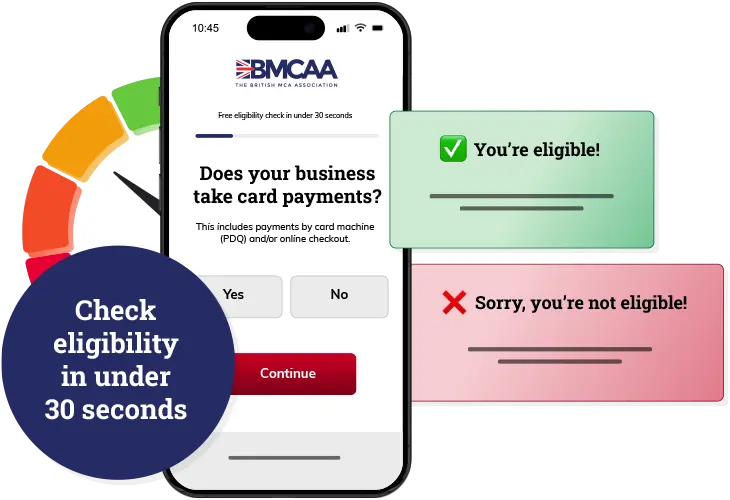What is a merchant cash advance?
A Merchant Cash Advance (MCA) is a flexible, unsecured type of revenue based business funding designed for SMEs that take card payments from their customers.
You receive a lump sum of cash upfront in exchange for agreeing to repay it through a percentage of your daily credit and debit card sales. This means repayments automatically adjust in line with your sales performance.
Because repayments are linked to card sales, an MCA is best suited for businesses that regularly process credit and debit card payments. If your business doesn’t take card payments, this type of funding won’t be available.
Merchant cash advances are also commonly referred to as:
- Business Cash Advances (BCA)
- Card Machine Loans
- Credit Card Processing Loans
- PDQ Funding
- PDQ Loans
- Merchant Loans
MCA: A growing alternative finance solution
Alternative commercial funding is reshaping the financial landscape by offering faster, more accessible lending options beyond traditional banks. Among these, Merchant Cash Advances have emerged as a flexible solution tailored to small businesses that accept customer card payments, particularly in sectors like retail and hospitality.
Driven by the rising demand for fast, flexible funding, the global Merchant Cash Advance market continues to expand. Valued at $17.9 billion (£13.3 billion) in 2023, it is projected to reach $32.7 billion (£24.3 billion) by 2032. This steady growth reflects how more businesses are turning to MCAs to support day-to-day operations, cover short-term gaps, or fund growth without the delays of traditional lending.
In the UK, MCAs are now firmly recognised as a key component of the alternative finance space. They sit alongside other innovative solutions such as peer-to-peer lending, crowdfunding, invoice finance, asset-based lending, revenue-based financing, and short-term business loans. For businesses underserved by banks, MCAs offer a fast and flexible route to capital.
The UK Bank Referral Scheme
Since 1st November 2016, the Bank Referral Scheme has required major UK banks to refer small businesses rejected for traditional finance to government-approved platforms. These platforms connect businesses with alternative finance providers who may offer the funding needed to support growth and expansion.

How much can I borrow with a merchant cash advance?
The amount you can borrow will typically align with the value of your average monthly credit and debit card sales. In many cases, you could receive an advance of up to 200% of your monthly card turnover (twice your monthly card sales), depending on your business performance and provider criteria.
Lenders typically offer advances from as little as £1,000 up to £1,000,000 or more. The exact amount you’re eligible for will depend on your business’s monthly card turnover and its ability to comfortably repay the advance.
Amount example
Let’s say your business takes £10,000 in card payments each month, you could potentially borrow up to twice that amount, meaning you could access up to £20,000 in funding.
Check how much you could borrow
Move the slider to match your monthly card revenue to see how much your business could borrow.
Min. £1k Max. £1m£1,000
£1,500*
Calculator is for illustrative purposes only.
*Estimates are based on up to 200% of your monthly card revenue. Actual offers may vary, and not all lenders will provide this amount.
Check if you qualify for a Merchant Cash Advance in seconds
Compare free quotes from lenders and discover other funding options available to your business in just a few clicks.
Check Eligibility
How do merchant cash advance repayments work?
Unlike traditional business loans that require fixed monthly repayments, a merchant cash advance (MCA) is repaid automatically through a percentage of your daily card sales. Put simply, you repay when your business makes a card sale.
This makes it's ideal for businesses with seasonal fluctuations or variable sales. If your business experiences a slower month due to seasonality or a dip in sales, your repayments will naturally be lower during that period.
With no fixed terms or fixed monthly payments, it gives your business the flexibility to manage cash flow more effectively.
Repayment example

You repay a fixed percentage of your future card sales
Before the advance is approved, you and the lender will agree on a repayment percentage—commonly referred to as the "sweep". This typically ranges from 10% to 18% of your daily card sales and is automatically deducted each day until the advance is fully repaid.
The sweep rate is designed to be flexible and manageable based on your business's cash flow and sales volume. It's important to carefully review and agree on this rate to ensure it aligns with your financial circumstances and won’t disrupt your day-to-day operations.
Repayment example

Illustration based on a 10% sweep rate.
How much does a merchant cash advance cost?
The total cost of a merchant cash advance (MCA) varies depending on the lender’s criteria and how they assess the risk of your business. This risk assessment determines the factor rate which is the multiplier used to calculate the total amount you’ll repay.
While some lenders may offer competitive factor rates, the final repayment amount depends on your business’s profile and the lender’s pricing model.
For example
If your business processes £5,000 in monthly card sales and you request a £5,000 advance with a factor rate of 1.23, your total repayment would be:
£5,000 × 1.23 = £6,150.
If you agree to repay 10% of your future card sales, approximately £16 to £17 will be deducted daily. Assuming steady card sales, it would take about 12 months to repay the full amount.
Merchant Cash Advance Calculator
Calculate your MCA repayments by adjusting the borrow amount, factor rate, and monthly card sales below.
£
£
1
Calculator is for illustrative purposes only.
Factor rates explained
Lenders use a factor rate to calculate the total amount repayable. Unlike the percentage-based interest rate or APR commonly seen in other types of commercial lending, a factor rate is a fixed multiplier and typically ranges between 1.1 and 1.5. Each lender sets their own factor rate based on the level of risk they associate with the business.
For example
A restaurant processing £50,000 in card transactions needs £30,000 in funding. The lender applies a factor rate of 1.25. To calculate the repayment amount, you simply multiply the amount of borrowing by the factor rate.
£30,000 × 1.25 = £37,500.
This means the total amount to be repaid is £37,500.
What determines the factor rate?
Lenders determine your factor rate by assessing your business’s financial health. If your business is seen as higher risk, your repayment cost will be higher. Lower risk typically results in a better rate. Key factors include:
- Credit card sales – Strong, consistent card sales are essential. Expect to provide the last three months’ statements.
- Bank statements – Lenders review recent bank activity to assess cash flow.
- Time trading – Most lenders require at least six months in business, though some accept less.
- Industry risk – Some sectors are seen as higher risk, which can affect your rate.
- Transaction patterns – Regular sales are preferred over irregular income.
Factor rate risk example

Figures, factor rates and risk levels are provided for illustrative purposes only.
Are there any additional fees?
Generally, most merchant cash advance providers do not apply extra charges, hidden fees, late payment penalties, or early repayment fees. The total cost is typically agreed upfront through a fixed factor rate.
However, it’s important to check with your funder or broker to confirm there are no additional costs tied to their service. Always review the agreement carefully to ensure full transparency.
Can you repay early?
Yes, you can usually repay a merchant cash advance early, but it's important to check the terms first. Since MCAs use a fixed fee (called a factor rate) instead of interest, repaying early may not save you money unless early repayment discounts are offered.
💡 GOOD TO KNOW
Some providers may allow early settlement with a possible reduction in fees, so always ask about early repayment terms before agreeing to the advance.
Is a merchant cash advance unsecured?
Yes, a merchant cash advance is unsecured. This means you don’t need to provide any business assets or property as collateral to get the funding. However, some MCA providers may ask for a personal guarantee as security.
What is a personal guarantee?
A personal guarantee means you agree to repay the money personally if your business cannot. It makes you personally responsible for the debt if your business fails to pay.
Check if you qualify for a Merchant Cash Advance in seconds
Compare free quotes from lenders and discover other funding options available to your business in just a few clicks.
Check Eligibility
Advantages of a merchant cash advance
✅ Fast Approval and Funding
They can be approved quickly, with funds often deposited within 24–48 hours. This makes them a great option for businesses that need fast, hassle-free access to capital.
✅ Flexible Repayments
Unlike traditional loans, merchant cash advances have no fixed repayments. A set percentage of your daily card sales is collected. This means you repay more during busy periods and less when sales slow down.
✅ Minimal Eligibility Requirements
MCAs have fewer requirements than traditional loans. There's usually no need for collateral, and approval is based more on your card sales than your credit score.
✅ Use Funds However You Need
There are no restrictions on how you use the funds. Whether it’s stocking up on inventory, covering payroll, or handling an emergency expense, the choice is yours.
Disadvantages of a merchant cash advance
❌ High Overall Cost
One of the main drawbacks of a merchant cash advance is the higher cost compared to traditional business loans. The total amount you repay can be significantly higher, and there are usually no savings for early repayment. This can make MCAs an expensive form of financing, especially for businesses with tight profit margins.
❌ Funding Restricted by Card Turnover
The amount you can borrow is directly tied to your average card sales. This means businesses with lower card turnover may receive smaller advances, which might not be enough to cover larger funding needs.
❌ Short-Term Solution
Merchant cash advances are designed to provide quick cash injections but are not a sustainable long-term financing option. Relying on MCAs repeatedly can limit your ability to plan for future growth and may lead to ongoing financial challenges.
❌ Not Suitable for All Businesses
Businesses that don’t accept card payments or have inconsistent sales won’t qualify, limiting access to this funding option.
What are the risks?
While a merchant cash advance can provide fast and flexible funding, it’s important to be aware of the potential risks involved before committing:
⚠️ Risk of a Debt Cycle
If not carefully managed, an MCA can lead to a cycle of debt. Some businesses may feel pressured to take out additional advances to cover existing repayments, especially if sales slow down or unexpected expenses arise.
⚠️ Legal and Contractual Risks
If you breach your MCA agreement, such as by missing repayments, switching payment processors without notifying the provider, or ceasing trading, you could face legal action. Many MCA agreements include personal guarantees or allow the provider to pursue recovery through the courts.

How can a merchant cash advance be used?
A merchant cash advance can be used for almost any business-related purpose. Whether you need to smooth out cash flow or invest in growth, the funds are flexible and can support a wide range of needs, including:
- Purchasing stock or inventory
- Refurbishing or expanding premises
- Covering short-term cash flow gaps
- Paying off tax bills or other liabilities
- Investing in equipment or business assets
- Marketing and advertising
- Consolidate your existing debts

Who uses a merchant cash advance?
Businesses that accept credit or debit card payments through a PDQ terminal or an online payment system are well-suited to a merchant cash advance. From retail to hospitality, popular business types include:
- Restaurants and cafes
- Hotels and guesthouses
- Pubs and bars
- Retail shops and high street stores
- Beauty salons and barbershops
- Takeaways and fast-food outlets
- Petrol stations
- E-commerce and online retailers
- Gyms and fitness centres
- Dry cleaners and laundrettes
- Pharmacies and opticians
- Car garages and MOT centres
- Dentists
- Vets
Business types commonly declined by lenders
Most MCA lenders do not provide funding to certain types of businesses, industries, or sectors. These typically include estate agents, travel agents, financial services, debt management or collection companies, letting agents, booking agents and events companies, car sales (new or used), charities, and gambling businesses.
💡 GOOD TO KNOW
It’s always best to be upfront and honest about your sector and business activities to avoid delays or disappointment.
Do I qualify for a merchant cash advance?
To be eligible for a merchant cash advance in the UK, you’ll typically need to meet the following criteria:
1. Run a UK-based business
Your business must be registered and operating within the United Kingdom. This includes sole traders, partnerships, and limited companies.
2. Accept card payments from customers
Since repayments are taken as a percentage of your card sales, it’s essential that you process regular card transactions via a PDQ machine (chip & pin terminal) or through an online payment gateway. The more consistent your card sales, the better.
3. Generate a minimum monthly card turnover
Most funders require that your business processes at least £2,500–£5,000 in card payments each month. This ensures there’s a reliable cash flow to support the daily repayments.
4. Have a trading history of at least 3–6 months
Lenders want to see that your business is established and generating revenue. A short trading history may still be acceptable if your card sales are strong, but longer histories often improve your approval chances and funding terms.
💡 GOOD TO KNOW
Additional factors such as your business sector, seasonal sales patterns, and any existing financial commitments may also be considered by funders during the application process.
Are startup businesses eligible?
Generally, startup businesses trading for less than 3 months will not qualify for a merchant cash advance, as funders require a proven track record of regular card sales to assess risk and determine funding terms.
If your business is pre-revenue or hasn’t started taking card payments, it won’t meet the minimum criteria. Instead, consider start up loans, grants, or business credit cards until you’ve built up enough trading history.
Check if you qualify for a Merchant Cash Advance in seconds
Compare free quotes from lenders and discover other funding options available to your business in just a few clicks.
Check Eligibility
Is the MCA industry regulated?
Currently, the merchant cash advance sector is unregulated and does not fall under the Financial Conduct Authority’s (FCA) jurisdiction.
While MCA products are outside FCA regulation, many lenders voluntarily adhere to high standards of fairness and transparency to protect and benefit borrowers. You can expect clear, upfront pricing quotes with no obligation, along with open and honest communication throughout the process.
Does a business have a requirement to switch card payment providers?
Most funders don’t require you to change merchants to use their services. As more and more merchant payment providers arrive, they are integrated with the lenders so that there is no disruption to your payment services.
Merchant cash advances work with most major card payment processors, including:
- Square
- SumUp
- Dojo
- iZettle (now part of PayPal)
- Worldpay
- Lloyds Cardnet
- Barclaycard Payment Solutions
- Stripe
- Sage Pay
- Elavon
- Adyen
- Valitor
Switching card payment providers
If you're expected to switch card processors, the process is usually straightforward and designed to minimise disruption. In rare cases where a lender requires you to use a specific merchant services provider, they’ll typically support you through the transition. This might involve helping you set up the new terminal or integrating the new system with your existing setup to ensure payments continue to flow smoothly.
💡 GOOD TO KNOW
Most funders aim to keep the switch as seamless as possible so your business can keep trading without interruption.

What is usually required to complete an application?
The process is typically straightforward and involves minimal paperwork, making it faster and simpler than traditional loans. Generally, you’ll need to provide:
- A completed online application form including contact information and basic business details
- Merchant statements (usually from the last 3 months)
- Bank statements (sometimes requested)
- Proof of ID
- Management accounts may be required for larger advance amounts
- A personal guarantee may also be required
Many providers also carry out a soft credit check during the application process. This doesn’t affect your credit score, unlike a hard credit check, making it less risky from a credit rating perspective.
💡 GOOD TO KNOW
Typically, no asset security, business plans, or homeowner status are considered, making the application process even more accessible for many business owners.
How long does the process take from start to finish?
With most lenders, the entire process from application to receiving the funds, typically takes around 2 to 3 working days. In some cases, it can be even faster (within 24–48 hours), depending on how quickly the required information is provided and verified.
Can I get a merchant cash advance with bad credit?
Yes, you can still get a merchant cash advance with bad credit. MCA providers focus more on your business’s card sales and revenue rather than your credit score.
MCA’s and credit building
Merchant cash advances (MCAs) typically do not help build your business credit because most MCA providers do not report repayments or activity to commercial credit reporting agencies.
💡 GOOD TO KNOW
If building business credit is important to you, it’s worth confirming with the lender whether they report repayment history before proceeding.
When to use a broker service
When applying for the best deal in the market, it is advantageous to seek comparative quotes from lenders. By engaging with a cash advance brokerage firm, you should receive the best deal for your business.
Many brokerages don’t charge a fee and are paid a commission by the lender on the drawdown of funds. A good tip is to check with the brokerage that they don’t charge a fee for their service. Some specify this on their website.
Looking for funding? Find trusted lenders and brokers in our directory.